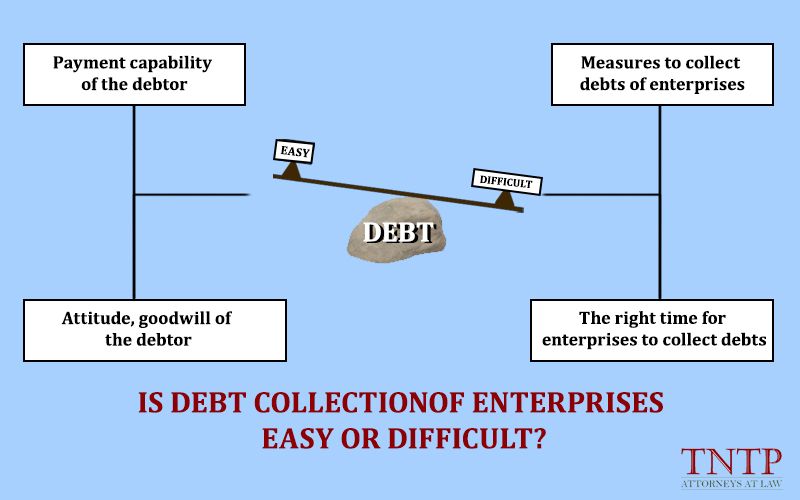Is debt collection of enterprises easy or difficult?

Every enterprise, big or small, operating in any field, always has to face the arising of debts. Therefore, in the current context, the debt collection of enterprises is considered extremely important because it directly affects not only the capital but also the financial plans and activities of enterprises. Is it easy or difficult to collect the debts of enterprises? This article will mention the factors that affect debt collection of enterprises.
1. Payment capability of the debtor
The debtor’s payment capability is the financial capacity of that enterprise to pay its debts. This is the most important factor to determine the ability to collect debts of an enterprise because the goal of enterprises is to recover the money that the debtor has not paid. Therefore, in case the debtor has no money, assets, and payment capability, no matter what measures enterprises take, it is impossible to collect the debt.
Therefore, in the process of cooperation, enterprises should regularly pay attention to the status of the operation of partners and clients. If the debt arises when the partner or client has difficulties in business activities, enterprises need to quickly take measures to require the partner and client to pay the debt as soon as possible before the partner or client is insolvent. Thereby, it will be easier for enterprises to collect the debts.
2. Attitude, goodwill of the debtor
The attitude and goodwill of the debtor is also an important factor in the debt collection of enterprises. If the debtor has goodwill and actively pays on time when having money, the ability for enterprises to collect the debts will be high. However, in many cases, although the debtor is able to pay, they still deliberately avoid paying the debt or they will prioritize using that money to serve their business instead of paying the debt. At that time, that debt will likely prolong and the ability for enterprises to collect the debts will be difficult.
According to the principle of civil settlement under Vietnam’s law, it is always encouraged and respected if the parties reach an agreement. Therefore, when the debt arises, enterprises can agree with the debtor on the plan to pay the debt in advance. In case the debtor is not in good faith or has an uncooperative attitude, avoids the payment of the debt, then enterprises need to take tough measures, give legal grounds and warn about the possibilities that the debtor will have to suffer if the debtor continues to avoid paying the debt.
3. Measures to collect debts of enterprises
Enterprises should apply a variety of policies and measures to collect debts. For each different debtor, the enterprise can choose different measures. Forms of debt collection that enterprises can apply are: calling, reminding, sending dispatches, collecting debts directly, or authorizing representatives to carry out legal procedures for debt collection.
If enterprises appropriate measures for each object and debtor, the ability for enterprises to collect the debts will be easier. The application of illegal or inappropriate debt collection measures to the debtor (For example: being tough with a party having goodwill and loose with a party not having goodwill) can make it much more difficult for enterprises to collect debts.
Therefore, depending on each debtor, enterprises should flexibly apply appropriate measures to help debt collection be quick and easy.
4. The right time for enterprises to collect the debts
Firstly, about the right time to collect debts since the debts arise: Enterprises can refer to the article “Since the debt arose, what time should creditors collect the debt?” Accordingly, the most appropriate time to collect debts is from 1 to 3 months since the debt arose. From 3 months to 12 months since the debt arose, the ability to collect debts is difficult. For 1 year or more, the rate of successful debt collection is low. Debts that have been incurred for more than 3 years are extremely difficult to collect.
Therefore, as soon as debts arise, enterprises should take measures to collect debts, avoid prolonging debts, which makes it difficult to collect and affect the business activities of enterprises.
Secondly, about the appropriate time in a year for debt collection: Enterprises can refer to the article “The time in a year that creditors should collect debts“. The third quarter of the year is the “golden time” for enterprises to collect debts. The first and second quarters are the beginning of the year, at this time the business of the debtor starts to be profitable, so it will also be able to pay but not high. The fourth time, the end of the year is the time when enterprises have to summarize revenues and expenditures, so it is not an appropriate time to collect debts.
Therefore, enterprises should conduct debt collection at the time of the third quarter of the year.
Above are the legal shares about the issue “Is debt collection of enterprises easy or difficult”. Hope this article is useful to you.
Best regards.
You may need Legal service of debt collection in commercial activities.
Join Fanpage Dispute Settlement and Debt collection to get more useful legal knowledge.
TNTP and Associates International Law Firm
Lawyer Nguyen Thanh Ha
Email: ha.nguyen@tntplaw.com



